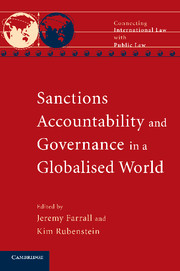Book contents
- Frontmatter
- Contents
- Contributors
- Series editors' preface
- Editors' preface
- Introduction: Filling or falling between the cracks? Law's potential
- PART I Setting down the foundations
- PART II Internationalising public law
- 3 Globalisation and public law: A global administrative law?
- 4 The deliberative deficit: Transparency, access to information and UN sanctions
- 5 Who guards the guardian? Towards regulation of the UN Security Council's Chapter VII powers through dialogue
- 6 Holding the United Nations Security Council accountable for human rights violations through domestic and regional courts: A case of ‘be careful what you wish for’?
- PART III Implementing Security Council sanctions
- PART IV The place of corporations
- PART V The role of lawyers
- PART VI Public law and public policy
- PART VII Parallel case studies
- Concluding remarks
- Bibliography
- Index
5 - Who guards the guardian? Towards regulation of the UN Security Council's Chapter VII powers through dialogue
Published online by Cambridge University Press: 05 October 2010
- Frontmatter
- Contents
- Contributors
- Series editors' preface
- Editors' preface
- Introduction: Filling or falling between the cracks? Law's potential
- PART I Setting down the foundations
- PART II Internationalising public law
- 3 Globalisation and public law: A global administrative law?
- 4 The deliberative deficit: Transparency, access to information and UN sanctions
- 5 Who guards the guardian? Towards regulation of the UN Security Council's Chapter VII powers through dialogue
- 6 Holding the United Nations Security Council accountable for human rights violations through domestic and regional courts: A case of ‘be careful what you wish for’?
- PART III Implementing Security Council sanctions
- PART IV The place of corporations
- PART V The role of lawyers
- PART VI Public law and public policy
- PART VII Parallel case studies
- Concluding remarks
- Bibliography
- Index
Summary
Introduction
This chapter addresses the question of how the supremacy of the rule of law can be sustained in relation to the Security Council acting under Chapter VII of the UN Charter. Since the 1990s, recourse to Chapter VII has become a commonplace and unchallenged practice of the Council, furnishing a wide range of flexible grounds for justifying its actions. The highly political nature of the body, influenced largely by the five permanent members (P-5), in combination with the discretionary use of Chapter VII powers, has allowed the Council to expand its scope of activities whenever the political hurdle of the veto can be overcome. Recent developments in the Council's activity have seen a legislature-like endeavour to address threats posed by non-state actors, and more complex and technical administrative operations imposing sanctions against such non-state actors.
There is no doubt that Chapter VII powers must be exercised consistently with the UN Charter. The legality of the Council's actions is subject to the purposes and principles of the Charter including subsequently developed human rights norms. It is also arguable that the Council's decisions under Chapter VII must be adopted within the jurisdictional limits, which form the prerequisites for the valid exercise of Chapter VII powers. Yet the reference to such requirements does not automatically lead to the objective assessment of the legality and validity of the Council's action. It requires a mechanism whereby the legality and validity of the Council's decision is subject to public scrutiny.
- Type
- Chapter
- Information
- Sanctions, Accountability and Governance in a Globalised World , pp. 123 - 142Publisher: Cambridge University PressPrint publication year: 2009
- 2
- Cited by



